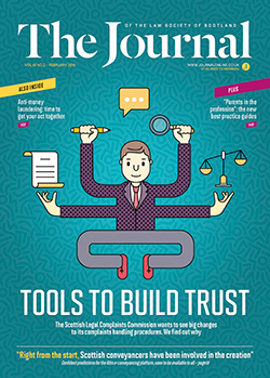Seeking growth

Do you remember when the term “paralegal” was synonymous with the often-used term “glorified secretary”?
The Oxford English Dictionary defines a paralegal as “a person with some legal training whose job is to help lawyers”. Wikipedia’s definition is somewhat less vague – “A paralegal is an individual, qualified by education, training or work experience who is employed or retained by a lawyer, law office, corporation, governmental agency or other entity and who performs specifically delegated substantive legal work for which a lawyer is responsible.” Our own Law Society recognises members of the Registered Paralegal scheme as having “a defined, recognised and meaningful professional status”.
So what is our role? This cannot always be summed up in a simple definition, and ultimately we have to define our own status, which can depend on many factors, for instance the size of the firm we work for.
However, we have a professional career of which we can be proud and which continues to grow across Scotland, with more and more recognition as time goes on.
What can we do to continue this growth? The Registered Paralegal scheme is a large step towards continued development and recognition. If you are not already a member, we at the SPA would like to hear from you. Please drop us an email simply letting us know why you may not have joined the scheme.
CPD: we must continue to learn
We on the committee are often asked about holding CPD events across the country but, as you will all appreciate, arranging a venue and speakers can be an expensive exercise. We are more than happy to arrange CPD; however, we must be sure that the event will be well attended. We have offered free CPD in various towns across the country, only for speakers who have given up their time to find only one or two paralegals attending the event. Again, if you have any requests for CPD, or questions, please send us an email.
On that note, if you are thinking about a further qualification – perhaps branching into a different area – CLT are offering incentives for anyone wishing to study for a second (or even third) qualification. If you have qualified through CLT previously, and wish to further your studies, please contact them directly.
Finally, we must continue to promote our profession. Encourage our young people, colleagues and friends to look at the role of the paralegal as “an alternative career in law” – which is my own personal definition of the term paralegal.
As always, please do not hesitate to contact us at any time on info@scottish-paralegal.org.uk, or write to us at LP 3, Bridge of Allan.
In this issue
- A trainee perspective on leadership
- Beyond the Bribery Act
- Legal IT: the potential of blockchains
- Directors: the parent over your shoulder
- Ten for starters
- Reading for pleasure
- Journal magazine index 2015
- Opinion: Daniel Donaldson
- Book reviews
- Profile
- President's column
- The big 4-0-0 approaches
- People on the move
- Balance in redress
- Pension allowances: the last chance
- E-conveyancing: the real deal
- Deeds of conditions: not dead yet
- Anti-money laundering: a call to action
- New challenges, new CEO
- Rape terms before the appeal court
- Another year of change
- Defending the abduction
- The right to snoop?
- Fond farewell
- Scottish Solicitors Discipline Tribunal
- Dilapidations: enforcing the bargain
- Title out of nothing
- Charged and ready
- Updates from the OPG
- The family way
- Conflict of interest: the questions still come
- Seeking growth
- Fraud: a battle of wits
- Light to a Safe Harbour
- Through the client's eyes
- Ask Ash
- Law reform roundup






